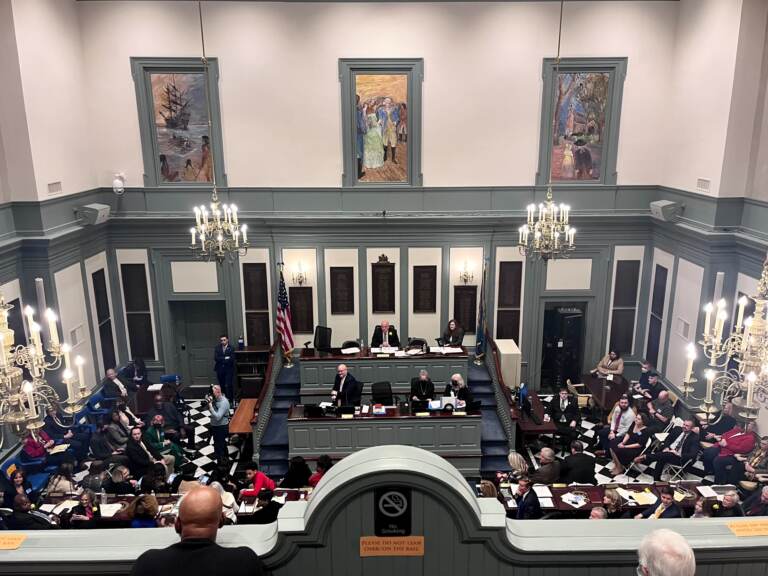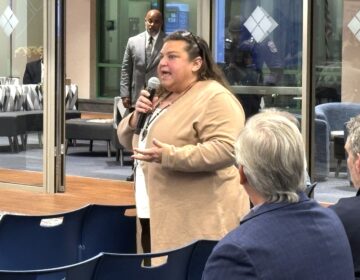Delaware lawmakers approve bill requiring Medicaid to cover abortion procedures
The legislation expands access to abortion and the use of state funding to cover the procedures. It now goes to Gov. John Carney.

The Delaware General Assembly in session at the Legislative Hall in Dover, Delaware. (Johnny Perez-Gonzalez/WHYY)
From Philly and the Pa. suburbs to South Jersey and Delaware, what would you like WHYY News to cover? Let us know!
This story was supported by a statehouse coverage grant from the Corporation for Public Broadcasting.
The Delaware General Assembly has approved legislation mandating private health insurers and Medicaid cover the cost of medication abortion.
The House passed the bill in May, and the Senate signed off on it this week in a party-line vote. It now heads to Gov. John Carney for his consideration.
If it becomes law, Delaware would join New Jersey and 16 other states that require funding for abortions under Medicaid, according to KFF, a health policy research and news organization. Ten states mandate group plans, and individual plans include abortion coverage. Only New Jersey allows cost-sharing for the procedure if there’s cost-sharing for similar services in the plan. The other nine prohibit it.
Delaware Democratic lawmakers approved a set of bills expanding access to abortion around the second anniversary of the U.S. Supreme Court decision reversing federal abortion rights and leaving it up to the states. Currently, Delaware allows abortion up to viability, which is generally around 24 weeks. Minors must have parental consent, and providers are shielded from investigations by other states.
New Jersey allows abortion at all stages of pregnancy. Since the SCOTUS decision, the Garden State has required that Medicaid and private insurers cover the procedure and the state also has a shield law for providers. Pennsylvania bans abortions after 24 weeks, and patients must wait 24 hours after counseling to obtain the procedure. Medicaid and private insurance coverage of the service is prohibited except under very limited circumstances. Pa. also has a shield law.
“Continuing to deny coverage for abortion will create health disparities instead of dismantling them,” said Delaware Senate sponsor Kyle Evans Gay. “The lack of coverage disproportionately affects marginalized communities, low-income individuals and people in regions with limited health care resources, including Sussex County.”
The bill caps the abortion benefit at $750 annually. Gay said that would cover most abortions in Delaware. The cost, on average, is nearly $600 for a medication procedure, according to legislative analysts, who used data from the Delaware Division of Medicaid and Medical Assistance and a survey of termination providers to create the fiscal note for the bill. It is estimated that about 85% of abortions in the state are non-surgical procedures. According to the Guttmacher Institute, 30% of women who are of child-rearing age in Delaware live at 200% of the federal poverty level.
The debate in the Senate centered on women’s bodily autonomy and religious and moral objections to abortion.
“This is a procedure that you want my tax dollars to pay for,” Republican Sen. Bryant Richardson said. “I’m sorry, I think this is evil.”
While mandating coverage, the legislation also prohibits most insurers, including ones covering state employees, from charging copays or imposing deductibles or other cost-sharing requirements for abortions. Religious employers would be allowed to exempt themselves from providing the coverage if they can prove they have a sincere religious objection.
The fiscal cost for FY 25 is more than $503,000, with a $250,000 one-time cost. Two other abortion-related bills have passed the Senate and are awaiting consideration in the House. One requires public universities and colleges with student health centers to give access to medication abortion. The second mandates crisis pregnancy centers post a notice if they are not a state-licensed medical facility and don’t employ a licensed medical provider.

Get daily updates from WHYY News!
WHYY is your source for fact-based, in-depth journalism and information. As a nonprofit organization, we rely on financial support from readers like you. Please give today.







